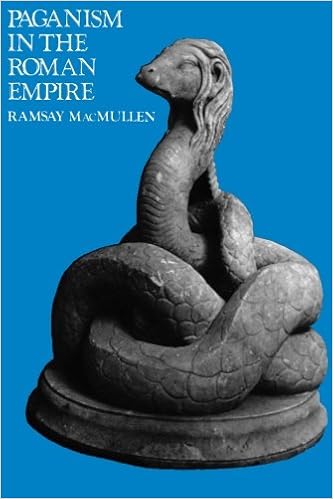This is a good survey of the pagan religions as they existed between about 100 B.C. and 400 A.D. in the Roman Empire, with an emphasis on the first two centuries of the Christian era. MacMullen notes many of the seeming contradictions that exist when we look at paganism as a whole in the empire and how it is quite impossible to talk of its rise and demise on any kind of decade-long cycle. But mostly MacMullen looks at how Roman society functioned with its wide array of gods pulled in from its various conquered domains.
Pagan religions were part of daily life. They were the means by which social functions happened. The poor, without recourse to large homes in which to host parties, hosted them in temple dining rooms. Festivals, put on by supporters of a particular god, invited people to come celebrate with them--there were parades and other fun activities.
Particular gods became popular, it appears, largely through sponsorship of rich patrons or government officials. They could change with the change of the local legate. People's personal gods--the local gods, the ones of each conquered nation--had more sticking power in the local area. And it, was more than trade or military service, largely slavery that accounted for the spread of a god in new locales, as slave families adhered to the ancient customs.
The rich and educated may have paid for and advocated a particular god. Philosophy may have leaned more and more on the idea of one god--or more properly, the superiority of one god, of which all the gods were manifestations. But the common people remained largely unmoved by such ideas.
As such, there wasn't a lot of missionizing in the sense that we would account for in religious conversion today. The most dominant argument for a deity was generally based around miracles--healings and the like. This was likely the appeal of Christianity, along with the martyrdoms to Christians endured, which were a kind of wonder in themselves.
Gods gained and lost popularity. At the time that Constantine came to power, the Sun was in the ascendant. But had he not converted to Christianity, the process of various other pagan gods gaining popularity for a time would have continued.
If this summary seems somewhat disjointed, that is probably partly because MacMullen's text at times seems this way. There is a clear organization underneath that flows along easily as one reads, but when one goes back to outline the thoughts included, it is a bit difficult, so fluid is the discussion.







No comments:
Post a Comment